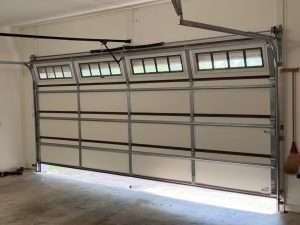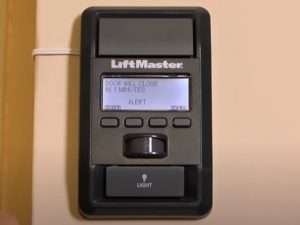What Should I Use to Lubricate My Garage Door?

Two of the most common questions a garage door technician will receive is “What should I be using to lubricate my garage door?” and the next question usually is “How often should I lubricate my garage door?”.
Most homeowners look for whatever is available in their garage, which is typically a spray can of traditional WD-40. They lubricate their garage door to find out it is only getting louder over time. Let’s address this issue and talk about what you should be using to lubricate your garage door.
The Best Garage Door Lubricant

The best garage door lubricant is National 400 Garage Door Lube. This high-performance lubricant is ideal for metal-to-metal applications that require heavy-duty lubrication and protection against rust and corrosion.
The convenient 3-way spray nozzle allows you to spray precisely where you want. It is the most commonly used lubricant by garage door professionals.
Using the right lubricant will prolong the life of your garage door and opener. We understand that the National 400 lubricant is not available everywhere for a homeowner to purchase.
Further down in this article, we go over some recommended alternatives you can find at your local home store.
Do Not Use “Traditional” WD-40

When used on a garage door, traditional WD-40 will strip the oil off metal components, therefore removing any lubrication. Garage door lubricant is designed for hinges, rollers, tracks, cables, and pulleys. It can also be used on automatic openers for chains, sprockets, and contact switches.
Contrary to popular belief, traditional WD-40 is not a long-term lubricant. It is a short-term lubricant, cleaner, and rust preventative. If you ever get tar on your hands or maybe on your vehicle, you can use traditional WD-40 to remove it.
The Crayola Corporation recommends using traditional WD-40 to remove Crayola marks from a variety of surfaces. It works well for this application, and it has many other uses.
When used on a garage door, traditional WD-40 will strip the oil from metal components, therefore removing any lubrication. You now end up with metal on metal with no lubricating oil to reduce friction and quiet down the door. This is why the garage door will actually get louder over time after applying traditional WD-40 to all moving parts.
Even though we don’t recommend using traditional WD-40 to lubricate your garage door, we do recommend using it to clean your garage door tracks. It works well at removing any grease or debris that has built up over time. Brake cleaner works well for this task as well.
Why National 400 Garage Door Lube?
National 400 garage door lube is a non-silicone lubricant designed specifically for overhead garage doors and openers. The lubricant is designed to penetrate frozen parts, threads, bearings, and all other metal surfaces. It is a rust and corrosion preventative that also helps reduce the build up of dust and dirt so garage doors and openers are operating at peak performance.

National 400 garage door lubricant features a special 3-way nozzle that can spray a mist or a fine stream. The “L” setting which stands for low output is great for close up applications while the “H” setting stands for high output which will spray a fine stream for applications from a further distance. The can comes in a 15oz size that is larger than most other garage door lubricants on the market today.

The manufacture states on the can: “pliable, firm coating has a polar attraction to metal surfaces and does not crack or age harden”. They also state: “This product protects electrical connections, wiring, and prevents galvanic corrosion”. Very interesting stuff. All I know is we have used this lubricant for many years with great success. They have something right with the formula.

They recommend spraying National 400 liberally on all moving parts or doors, operators, locks, rollers, chains, sprockets, cables, hinges, springs, and even electrical contact switches and terminals. Yes, it works great to reduce corrosion on travel limit contact switches found on garage door openers. If corrosion build up on the switch, they won’t ground out and stop in operation.
Loud Garage Door Before & After National 400 Lubrication
We recently came across one of the loudest garage doors we have ever heard due to lack of lubrication. Normally when a garage door is this loud, there is metal rubbing on the horizontal tracks or a part has completely failed causing the noise.
Because I could not see anything physically wrong with the garage door, I started with a good lubrication bath using my trusty National 400 lube and ran the garage door a few times. Much to my surprise, that’s all it was. Just another testimony for the best garage door lubricant in the business… National 400 garage door lube.
Everyone in the garage door industry knows National 400 is the best. If they are not personally using it, it’s because National lubricant cost a little more than other less effective options on the market.
Alternatives to National 400 Lubricant
The best place to purchase National 400 lubricant is online or from the company that services your garage door. It is the most commonly used lubricant in the garage door industry. If they don’t offer it or if you are having a hard time finding it, here are some alternatives you may be able to find at your local store.
Many home centers carry 3-IN-ONE, WD-40 Spray White Lithium Grease, or Blaster Garage Door Lube. We tested all three garage door lubes in the field. While all lubricants seem to quiet down the garage door, we preferred the 3-IN-ONE Professional Garage Door Lubricant and the WD-40 White Lithium Spray because they had very convenient built-in straws.
The built-in straws were handy because they allowed you to use the cans two different ways. You could use it with the straw folded down for a more broad spray, or you could use it with the straw flipped upwards for a more concentrated spray for harder to reach areas. The built-in straw is permanently attached, so there is no chance of losing it. Great feature!
The Blaster garage door lube sprays at a high rate, causing it to drip all over the ground. On the contrary, the WD-40 White Lithium Spray Grease probably sprayed the best because it is a thicker product that clings to the surface you are spraying. The built-in straw helps direct where you want to apply lubricant and will never get lost due to its permanent attachment.
How Often Should I Lubricate My Garage Door?
On the can of National 400 lubricant, they state one application is good for a year. I usually recommend lubricating your garage door at least two times per year.
If you live in a really hot climate, you might want to lubricate your garage door once every three months. This will ensure all hardware on the garage door is moving freely, which helps prevent wear and prolongs the life of the components.
Where Should I Lubricate My Garage Door?

There are several areas on a garage door that need lubrication a couple of times a year. Keeping your door lubricated will help prolong not only your door, but your garage door opener as well.
A smooth running, well-balanced garage door takes less effort to open and close, therefore reducing stress on your automatic opener. Let’s take a look at the photo below to determine how to lubricate your garage door.
Torsion Springs

Torsion springs are mounted above your garage door. Lubricating these springs will help reduce friction and noise as the coils rotate when the door opens and closes.
One side of a torsion spring is fixed, while the other side of the spring will rotate one full rotation per foot height of the door. The coils on the spring can get loud over time. Applying some lubricant will help with this issue and reduce friction as well.

There is a metal bearing or plastic bushing inside the torsion spring mounting cone on one end that needs lubrication as well. The plastic bushing will sometimes create a high pitch squeal if it requires lubrication. One squirt of lube will resolve this issue.

If you have a pair of torsion springs, try to use the straw on your lube can to squirt some oil in between the mounting cones. This will be harder to do because the bushing is not exposed like on a single spring set up. DO NOT try to disassemble your spring assembly to lubricate the bearing or bushing. This can be EXTREMELY dangerous.
Bearing Plates

Bearing plates are mounted at the top of your tracks on a torsion spring setup. This is the plate that supports the torsion shaft at both ends of the garage door. They have a large bearing that requires lubrication to keep moving freely.
Spray some lubricant where the shaft is coming out, and it will work its way into the bearing when you use the garage door. This lubrication point often gets overlooked. The bearing plates are doing most of the work, since they carry the full weight of the garage door.
Hinges

The hinges on a garage door are the main pivot points that keep the sections inline as the door goes up and down. They are metal on metal and require lubrication to keep friction and noise to a minimum.
A standard 16′ x 7′ garage door has 15 hinges that need lubrication. When hinges and rollers are lubricated properly, your garage door opener will perform better.
Rollers

Garage door rollers vary in material and type. The standard plastic roller that comes with a garage door does not have a lubrication point.
Premium nylon or steel ball bearing rollers do have a lubrication point where the stem meets the roller. Lube can be applied at this point to free up the bearings and reduce friction.
Lock

The lock on a garage door is a necessity for anyone who doesn’t have an automatic opener or if the power goes out. Lubricating the garage door slide lock will make it easier to engage and disengage any frozen parts that might be sticking due to rust and corrosion.
Pulleys

If your garage door is equipped with extension springs that are mounted above the tracks on both sides of your door, then you will need to lubricate the pulleys. There should be 4 pulleys’ total, 2 on each side.
These pulleys have ball bearings in the center that will get sticky and cause the door to shake side to side as it is going down. Lubricating the bearings in these pulleys will eliminate this issue.
Vinyl Trim

This might seem like an odd place to apply garage door lubricant, but spraying the backside of your vinyl or wood trim can help your garage door open and close easier. Many times a year, a home will expand and contract, therefore causing the garage door to rub against the jamb in operation.
Spraying the areas where the door is rubbing will make the door glide up and down much easier. This is a simple tip that is only known by garage door pros.
Should I Lubricate My Garage Door Tracks?

Contrary to popular belief, the tracks on a garage door DO NOT need lubrication or heavy grease. You will come across many sources online that tell you to lubricate the tracks on your garage door. They are wrong.
Lubricating the tracks or applying heavy grease will cause the rollers to slide in the tracks, not roll like they are intended to do. Heavy grease will also collect dirt and dust, therefore making it harder for your garage door to open and close.
How Do I Clean My Garage Door Tracks?

This is a good time to use regular WD-40. What many people don’t know is regular WD-40 is a great cleaner. It is good for removing oil, grease, and tar. You want to keep your garage door tracks clean and free of debris.
A little regular WD-40 and a rag is great for wiping down the inside of the tracks where the rollers travel. This helps remove any grease or debris from your garage door tracks. Brake cleaner also works well for this task.
Screw Drive Garage Door Opener Lubrication

If your home is equipped with a screw drive opener, you will need to lubricate the screw drive mechanism with a low temp grease. This will make it run smoother and quieter. Cut a 45-degree angle on the tip of your tube of grease and skim it along the screw drive rail. A little goes a long way.
If you apply too much grease to the screw drive rail on your garage door opener, it will glob up when you run the opener and fall on your car or the ground. You will then have a mess on your hands, especially if someone tracks it into the home.
We see this all too often, so remember, a little goes a long way. Skim the underside of the rail so the low temp grease fills into the screw drive grooves. That’s all you need.
Most chain drive garage door openers are considered to be lubricated for life according to the manufacturer. It doesn’t hurt to lubricate the chain or sprocket if you feel compelled to do so.
Keep in mind, anything you spray on the chain might drip down on your car or the floor to be tracked into the house. Belt drive openers do not require any lubrication.
What About Silicone Spray?
You will hear some garage door professionals recommend silicone spray for lubricating a garage door, but the overwhelming consensus in the garage door industry is silicone spray attracts more dirt. When dust and dirt starts to cling to lubricants, it creates a thick gummy like texture that ends up causing issues with the moving parts on a garage door.
For this reason, we have never recommended using silicone spray to lubricate a garage door. The National 400 Garage Door Lubricant states right on their can “No Silicones”. They are the gold standard of garage door lubes. If they don’t include silicones in their spray, then it’s probably for a good reason.
Conclusion
When searching for the “best” of anything on the internet, you will most likely come across articles recommending products sold on Amazon.com. The reason for this is when you click one of their links, they make a commission.
Most of the people writing these articles have never actually repaired a garage door. They have no idea which lubricants work best based on experience in the field with the products. That is the sad truth about the internet.
We recommend National 400 as the best garage door lubricant because it is the most effective lubricant we have ever used. It is also one of the most widely used lubricants in the garage door industry and National Industries also makes many other types of specialty lubricants for all types of scenarios.
We stated some alternatives earlier in this article, but if you’re wanting what the pro’s use, National 400 is it. The best place to purchase this lubricant locally would probably be at a reputable garage door dealer who has a retail storefront. A quick search online will yield some retail stores who sell the product as well.






